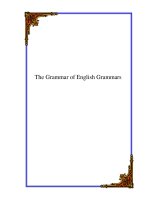The grammar translation method a demo
Bạn đang xem bản rút gọn của tài liệu. Xem và tải ngay bản đầy đủ của tài liệu tại đây (39.85 KB, 2 trang )
METHODOLOGY 1
The Grammar Translation Method – A Demonstration
When Jane and Elizabeth were alone, the former, who had been cautious in her praise of
Mr. Bingley before, expressed to her sister how very much she admired him.
“He is just what a young man ought to be,” said she, “sensible, good-humoured, lively;
and I never saw such happy manners! – so much ease, with such perfect good breeding!”
“He is also handsome,” replied Elizabeth, “which a young man ought likewise to be, if he
possibly can. His character is thereby complete.”
“I was very much flattered by his asking me to dance a second time. I did not expect such
a compliment.”
“Did not you? I did for you. But that is one great difference between us. Compliments
always take you by surprise, and me never. What could be more natural than his asking you
again? He could not help seeing that you were about five times as pretty as every other woman in
the room. No thanks to his gallantry for that. Well, he certainly is very agreeable, and I give you
leave to like him. You have liked many a stupider person.”
“Dear Lizzy!”
(Pride and Prejudice, Volume I, Chapter IV, Jane Austin)
……………………………………………………………………………………………………
……………………………………………………………………………………………………
……………………………………………………………………………………………………
……………………………………………………………………………………………………
……………………………………………………………………………………………………
……………………………………………………………………………………………………
……………………………………………………………………………………………………
……………………………………………………………………………………………………
……………………………………………………………………………………………..…….
Exercise 1: Write the Vietnamese translation for these words.
-
cautious (a)
praise (n)
admire (v)
breed (v)
likewise (adv.)
thereby (adv.)
-
flatter (v)
to be flattered by sth
to take sb by surprise
gallantry (n)
agreeable (a)
Exercise 2: Answer the questions in complete sentences.
1. What did Jane think Mr. Bingley was like?
2. What did she feel when he asked her to dance a second time?
3. Why did Elizabeth think his asking Jane to dance was natural?
4. What kinds of person were Jane and Elizabeth?
5. What do you think a man ought to be like to be of a complete character?
Exercise 3: Find the synonyms of these words from the text.
-
praise (n)
pleasing (a)
carefulness (n)
good-looking (a)
also (adv)
Exercise 4:
A. Write the antonyms of these words.
-
good-humoured (a)
lively (a)
different (a)
stupid (a)
former (a)
B. Write the antonyms of these words by adding an appropriate prefix in-, im-, un- .
-
happy (a)
sensible (a)
complete (a)
natural (a)
perfect (a)
Exercise 5: Complete the sentences with the verbs in parentheses in the Simple Past, the
Present Perfect or the Past Perfect.
1. I (buy) a new house last year, but I (not sell) my old house yet, so at the moment I have
two houses.
2. A woman (come) in with a baby, who she (say) just (swallow) a safety pin.
3. He (keep) looking at her, womdering where he (see) her before.
4. – I (play) football since I was five years old.
– You (play) since you (come) to England?
– Oh yes. I (play) quite a lot. I (join) a club the day after I (arrive).
5. I (arrive) in England in the middle of July. I (be told) that England (be) shrouded in fog
all year round, so I (be) wuite surprised to find that it (be) merely raining.









